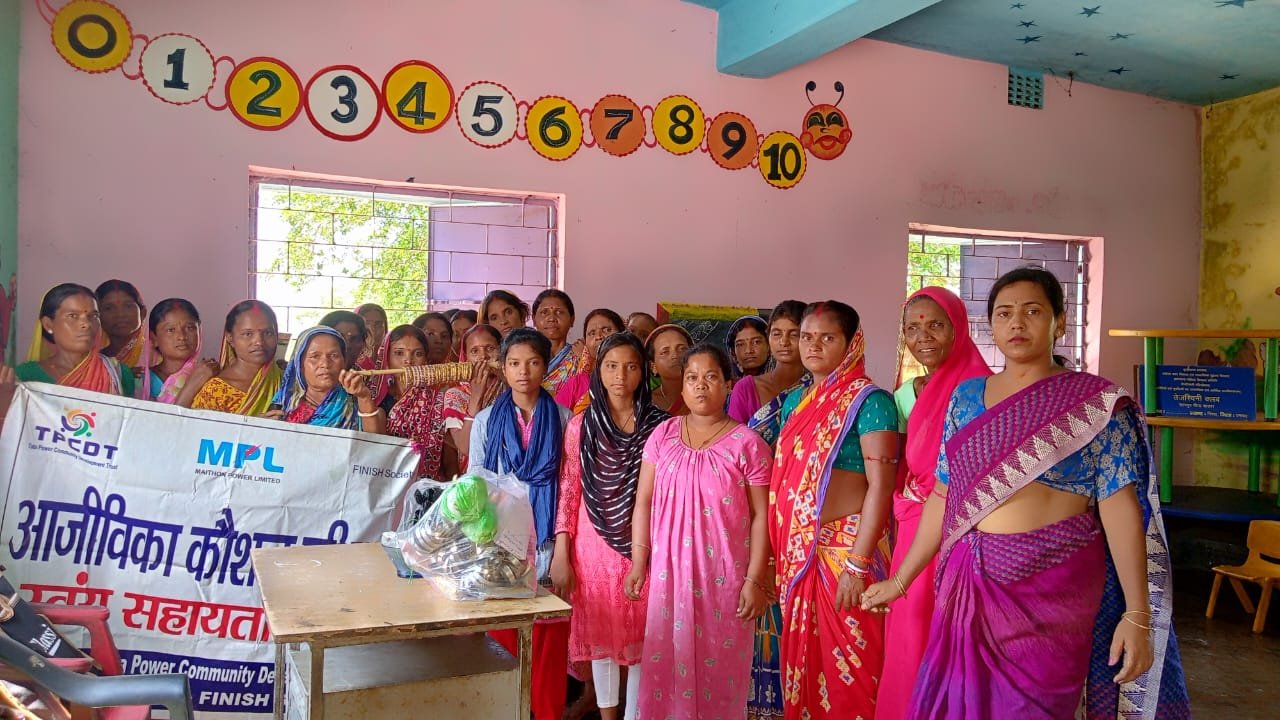
Women’s Empowerment Our Magic Mantra
The true empowerment will goes beyond forming groups or providing employment—it lies in Empowering women isn’t just about connecting them to income-generating activities—it’s about preparing them to face challenges, make informed decisions, and succeed in enterprise. That’s the belief driving the livelihood initiatives supported by Maithon Power Limited (MPL), Tata Power Community Development Trust (TPCDT), PwC India Foundation, and FINISH Society across diverse geographies like Jaipur, Rajasthan and Nirsa, Jharkhand.
Reviving Livelihoods in Jawahar Nagar, Jaipur

Jawahar Nagar Kachhi Basti, a densely populated informal settlement on the Jaipur–Agra bypass, is home to around 5,000 families. Most of these residents have lived here for over two decades. Prior to the COVID-19 pandemic, families earned an average monthly income of ₹10,000. However, the lockdowns caused a complete standstill—leaving thousands jobless and hopeless.
Recognizing the urgent need for intervention, FINISH Society, with its strong roots in WASH and community development, formed 10 Self-Help Groups (SHGs) to create employment pathways for local women. During household interactions, the team learned that women were eager to contribute economically but were limited by domestic restrictions, lack of training, and minimal exposure to markets.
Many had basic skills like stitching, cooking, and tailoring—but lacked the business know-how. That’s where PwC India Foundation stepped in. Together with FINISH Society, they organized intensive skill development training, empowering women with the knowledge to start and manage small businesses.
Their efforts culminated in the launch of Hamari Hunarshala, a women-led enterprise. With their own savings of ₹1,00,000, the women set up the company and began manufacturing pickles, spices, stitched dresses, and handicrafts. The organization supported them in developing their website, social media presence, and even listing their products on e-commerce platforms like Flipkart and Amazon. Today, directors Sarju Devi, Sita Yadav, and Gaura Devi proudly run Hamari Hunarshala, with continuous guidance from the FINISH team.
Adapting the Model in Nirsa, Jharkhand

While a similar model was implemented in Nirsa, Dhanbad district, the approach was uniquely tailored to suit the region’s geographical and economic context. Unlike urban Jaipur, Nirsa posed challenges of limited market access, low mobility among women, and seasonal income patterns.
FINISH Society, in collaboration with MPL and TPCDT, adapted the strategy with a strong focus on quick-impact livelihood opportunities. Recognizing the need for early returns to maintain motivation, women were guided to begin with locally viable and seasonally relevant products—such as handmade Diwali candles, gift packs, and natural Holi colors.
The project began with vocational training in beauty services and tailoring, followed by support to women-led SHGs in launching home-based production units for decorative items, incense sticks, soft toys, and garments. As part of enterprise development, training was provided in finance, operations, and marketing, enabling the women to build sustainable businesses from the ground up.
Scaling the Impact: Amritsar’s Sanitation Worker Families

In Amritsar, the approach was extended to the families of sanitation workers. FINISH Society formed women’s collectives by engaging the wives of sanitation workers and supported them with entrepreneurship training and small-scale production activities—helping uplift entire households from the cycle of economic vulnerability.
Key Infrastructure and Operational Support Provided
- SHG Formation & Handholding: Women were supported from the very beginning in forming Self-Help Groups (SHGs), fostering collective strength and ownership.
- Resource Mobilization: Guidance was provided to help women pool their savings and mobilize seed funds to initiate their enterprises.
- Capacity Building through Experts: Technical training sessions were conducted by subject matter experts covering production processes, quality control, packaging, and storage.
- Business and Financial Training: Women received comprehensive knowledge in business planning, costing, pricing, basic bookkeeping, and financial literacy.
- Marketing & Sales Enablement: Support was given in branding, packaging design, sales strategy, and establishing market linkages, both offline and online.
- Continuous Operational Support: Regular mentoring, monitoring, and problem-solving assistance were provided to ensure smooth daily operations and sustainable growth.
This journey—from Jaipur’s bastis to the rural heartlands of Nirsa and beyond—is a powerful testament to how customized, context-aware interventions can empower women not just to earn, but to lead. Women like Rupali Mandal—who once struggled for self-reliance—are now leading enterprises and inspiring many more to follow in their footsteps.
The success of these initiatives lies in their adaptive, participatory design—and in the unwavering commitment of partners like PwC India Foundation, Tata Power, and MPL, whose support is turning women’s aspirations into impactful enterprises.

